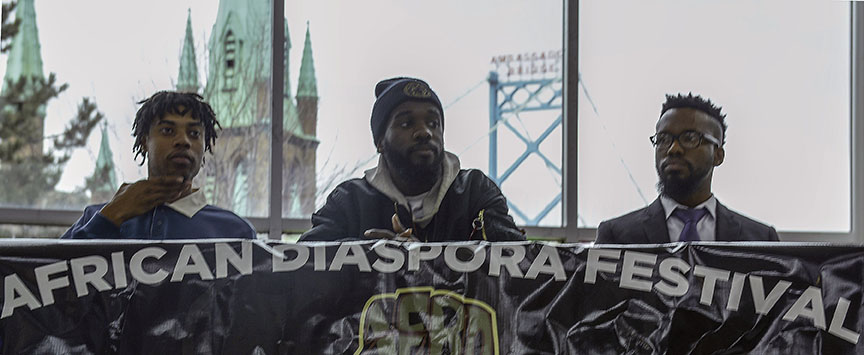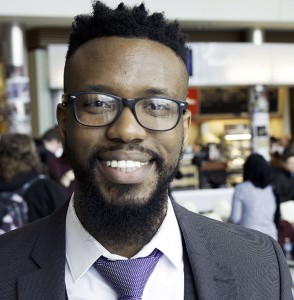Afrofest panel challenges stereotypical views

Zayne Gordon (left), Carlos De Sousa (centre), and Sheldon Harrison (right) discuss What is the image of a black man? with a group of students at the University of Windsor’s CAW Student Centre last week. The panel discussion was part of the African Diaspora Festival or Afrofest. The festival is a week of cultural and educational activities that document, food, fashion and culture of the black community in Canada. (Photo by David Lafreniere)
By David Lafreneire
Panelists challenged the stereotypical views of a black man during a discussion at Afrofest last week.
What is the image of a black man? was the provocative title of a seminar held during the festival. Afrofest is a week of cultural and educational activities that documents food, fashion and culture of the black community in Canada.
“The black man is the working-class man, the one who must do things in disproportionate numbers,” said University of Windsor student and panel member Sheldon Harrison. “He (the black man) is forced by demographics to be the overachiever or hyper-successful just for recognition. The image of the back man is a relatable human experience in every capacity.”
Being born white is the equivalent of winning the genetic lottery in the 21st century according to Harrison. He said he believes something that is a two-step process for a white man is a 10 or 20 step process for a black man.
“Statistically in America a white man with a criminal record actually has better chances of employment than a black man without one. I think the image of a black man is one that achieves in disproportionate numbers,” said Harrison.

Sheldon Harrison waits for a panel discussion to begin at the University of Windsor’s CAW Student Centre. The provocative discussion titled What is the image of the black man was part of Afrofest.
The panel discussed expanding the scope of the image of the black man. Harrison said there are many different versions of the black experience.
“It is not just the rapper or the athlete. There is also the artist, the Formula 1 driver, the scientist, the activist, the academic, the inventor,” said Harrison. “There are so many different examples of that throughout history. It is outrageous that people still assume a certain handful of buzzwords when they hear ‘black man.’”
“Entertainer”, “athlete” and “criminal” are buzzwords Harrison wants to challenge. Black men are expected to be entertainers according to Harrison. He said people assume that if they are successful financially it is related to athletic ability or criminality. Those are some of the stereotypes that Harrison wants to dissolve.
He wants to replace those words with “achiever”, “hard work” and “perseverance”. Harrison said black men achieve things and hit milestones despite extrinsic barriers.
“We live in a world where systemic racism is a real thing. On an institutional level, it is the equivalent of golfing with a handicap. Our handicap is different than a white man,” said Harrison. “We go into it knowing that, so we know we have to be hyper successful just to be at parity.”
The panel was led by Jaylin Nelson, a fashion stylist, blogger and YouTuber from Toronto. Panel members included Harrison, fellow student Zayne Gordon and Carlos De Sousa, a Toronto dancer, choreographer, film maker and educator.
The reality of systemic racism in defining the image of a black man was also part of the discussion.
“There are poor white people but they are not poor because they are white,” said Gordon.
De Sousa said to counter this, it is important to encourage men within the black community to mentor black youth.
“We can teach them they can be whatever they want to be,” said De Sousa.
During the introduction of the panel Nelson said through De Sousa’s film making he sheds light on being a black immigrant man growing up in Toronto. His journey from being a refugee, to being a VIP on international stages of MUCH Music and MTV, is captured in his film “Dance Saved My Life.”


